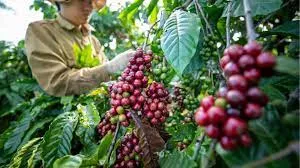Unveiling the Rich Aroma and Legacy of Coorg Coffee

Nestled amidst the lush hills of the Western Ghats in Karnataka, India, lies a coffee lover's paradise - Coorg. Renowned for its picturesque landscapes, serene ambiance, and verdant plantations, this region has earned its reputation as the "Coffee Capital of India." Coorg coffee, also known as Kodagu coffee, is celebrated for its exceptional quality, distinct flavor profile, and deep-rooted cultural significance. In this article, we will delve into the fascinating world of Coorg coffee, exploring its history, cultivation techniques, and the unique sensory experience it offers to coffee connoisseurs worldwide.
A Legacy Rooted in History: Coorg's tryst with coffee dates back to the 17th century when it was introduced by Baba Budan, a legendary Sufi saint. This land, blessed with fertile soil, optimal rainfall, and ideal elevation, proved to be the perfect environment for cultivating coffee. The early coffee plantations in Coorg thrived under the care of the Kodava community, who embraced coffee cultivation as an integral part of their agricultural practices and cultural heritage.
Cultivation Techniques and Varieties: Coorg coffee plantations predominantly grow two varieties of coffee beans - Arabica and Robusta. Arabica, known for its delicate flavor and aroma, thrives at higher elevations, while Robusta, with its bold flavor and higher caffeine content, is cultivated at lower altitudes. The unique microclimate of Coorg, with its cool temperatures, ample rainfall, and well-drained soil, provides the perfect conditions for coffee plants to flourish.
Coffee planters in Coorg follow sustainable and eco-friendly farming practices. They meticulously handpick the ripe coffee cherries, ensuring only the finest beans make it to processing. The traditional "wet method" is commonly used, where the cherries are pulped, fermented, and washed to extract the coffee beans. This careful process ensures that the final product retains its distinct flavors and natural characteristics.
Distinct Flavor Profile: Coorg coffee offers a delightful sensory experience to those fortunate enough to savor it. The Arabica beans from this region exhibit a nuanced flavor profile, characterized by notes of chocolate, caramel, berries, and a hint of spice. On the other hand, the Robusta beans deliver a robust, full-bodied cup with earthy undertones and a pleasant bitterness. These flavor profiles, coupled with the region's terroir, make Coorg coffee a sought-after choice for coffee aficionados seeking an exceptional and memorable cup of brew.
Promoting Sustainability and Fair Trade: Coorg's coffee industry has embraced sustainable practices to ensure the preservation of its pristine environment and support the local communities. Many plantations have adopted organic farming techniques, eschewing chemical pesticides and fertilizers in favor of natural alternatives. Additionally, fair trade initiatives have been implemented, ensuring that farmers receive fair compensation for their hard work, while consumers can enjoy guilt-free coffee that supports ethical practices.
Experiencing Coorg Coffee: For coffee enthusiasts, a trip to Coorg offers the opportunity to witness the entire coffee production process firsthand. Many plantations provide guided tours, allowing visitors to explore the coffee estates, learn about the cultivation techniques, and engage in coffee tasting sessions. Immerse yourself in the intoxicating aroma and immerse yourself in the rich coffee culture that has thrived in Coorg for centuries.
Coffee Production in India: Coffee production in India is dominated in the hill tracts of South Indian states, with Karnataka accounting for 71% (Kodagu alone produces 33% of India's coffee), followed by Kerala with 21% and Tamil Nadu (5% of overall production with 8,200 tonnes). Indian coffee is said to be the finest coffee grown in the shade rather than direct sunlight anywhere in the world.[1] There are about 250,000 coffee growers in the country; 98% of them are small growers.[2] As of 2009, Indian coffee made up just 4.5% of the global production. Almost 80% of Indian coffee is exported;[3] 70% is bound for Germany, Russia, Spain, Belgium, Slovenia, the United States, the United Kingdom, Japan, Greece, the Netherlands, and France. Italy accounts for 29% of the exports. Most of the exports are shipped through the Suez Canal.[1]
Coorg coffee stands as a testament to the harmonious relationship between nature, tradition, and exceptional craftsmanship. Its aromatic brews have enchanted coffee lovers worldwide, offering a sensorial journey that captures the essence of this remarkable region. Whether you're a passionate coffee drinker or a curious traveler seeking an authentic experience, Coorg coffee promises to delight your senses and leave an indelible impression. Savor a cup of Coorg coffee, and let its flavors transport you to the misty hills and verdant plantations of this coffee lover's haven.

